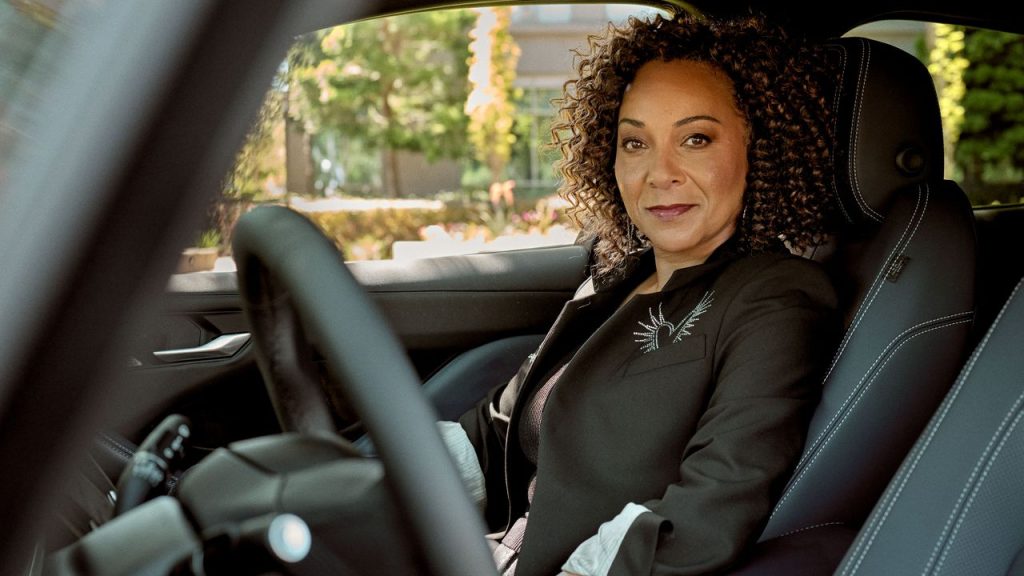Tekedra Mawakana won’t take the bait, no matter how many times I try. The co-CEO of Waymo, which operates the biggest fleet of driverless cars in the country, is rolling through the streets of downtown San Francisco with me in a modified Jaguar I-Pace. Elon Musk has claimed he’s coming to take down Waymo and its more than 1,500 robotaxis with competing Teslas that can operate in “Full Self-Driving” mode—beginning with a 20-vehicle invite-only autonomous taxi service that’s started testing in parts of Austin. In 2019 Musk pledged to have a million Tesla robotaxis in service by 2020. So far, the Austin experiment hasn’t exactly been flawless. Can you believe he’s trying this again? I pepper Mawakana in the back of the Jag. When his “self-driving” cars need a human in the seat to keep from crashing? “I don’t know,” she half-whispers, looking out the window. She lets out a quiet challenge to Musk, even as she makes it a point not to say his name. “There’s zero evidence of anything. And there’s so much talk about it. We have a whole service across many cities, right? It’s not a play to have fanboys. It’s a play to, like, actually change people’s lives.”
Waymo and Tesla are in the same game, at least from this angle. Mawakana’s company has built an autonomous driver, made of a suite of sensors and software, that can be used in vehicles from multiple car companies; Musk has said that if his cars can’t drive themselves, Tesla is “worth basically zero.” Each is using robotaxis as proof of concept. The similarities end there.
Mawakana, like the business she helps lead, is deliberate, strategic, focused, cautious. Waymo is her one and only company, and she shares the leadership duties. Musk is Musk. Mawakana is a safety obsessive, as is Waymo. Musk is emblematic of the move-fast-and-break-things ideology. While Full Self-Driving Teslas have killed multiple people, Waymo vehicles have not killed a single person. Musk is apparently convinced that all Teslas need to drive themselves are advanced cameras and the right amount of AI. His cars start at $42,000; hers, outfitted with 29 of those cameras plus advanced radar, laser range finders, and acoustic sensors, can cost seven times as much. She’s a lawyer by training and spent much of her career at the nexus of government and technology. Musk, in fairness, also spent time at the nexus of government and technology—130 rocky days. She’s one of a handful of Black female (or Black, or female) chief executives in Silicon Valley; he goes on his social media platform to whine about how “teachers in California spend their time indoctrinating kids in DEI racism & sexism & communism.” It’s hard to imagine Musk on skates (though he appears to be making good on his promise to build a “roller skates & rock restaurant” in Los Angeles). Mawakana says, “I can be found with roller skates and a beach tent in my trunk at all times.”
It sounds like a cute study in contrast. Except the future of the global automotive industry—and how we move through cities—could be at stake, depending on which CEO’s vision wins out. Tesla is by far the bigger company, with annual revenue of almost $98 billion and about $7 billion in earnings, compared to an estimated $75 million in revenue and an estimated $1.12 billion in losses last year for Waymo. Mawakana doesn’t have great answers for how many jobs her autonomous vehicles might eventually cost (opponents say it could be millions), or how many people it currently takes to supervise her self-driving fleet (her deputies will only talk about the “minutes of human time” needed for each hour on the road), or the resilience of that fleet when protesters start lighting her robocars on fire (in Los Angeles last June). But when it comes to autonomy, Mawakana is ahead. Waymo is logging at least 250,000 driverless paid rides per week in Austin, Phoenix, Los Angeles, and Silicon Valley, more than 10 million such rides overall. Waymo had expanded its operations to Atlanta on the day Mawakana and I rolled through San Francisco together. Miami and DC are next, and Waymo has begun preparation for New York City.
“She believes the technology should speak for itself, in customers’ hands, as opposed to telling customers what to believe about the future,” says Alex Roy, a general partner at New Industry Venture Capital and a former executive at Argo, the Ford-backed autonomy company. “That’s why I call her the un-Elon.”
Tekedra Mawakana speaking at SXSW at Waymo’s Austin launch.Travis P. Ball/Getty Images.
Mawakana lives a low-key life, at least by Silicon Valley mogul standards. She wasn’t invited to the Gilded Age Bezos wedding in Venice. She doesn’t bowhunt with Zuck, and she’s not joining Sam Altman in his doomsday structures. She lives in the same Bay Area home she bought when she was briefly a VP at eBay, in 2016 and 2017. Her art collection is modest, largely centered around Black and female artists, and is a “celebration of goddess energy.” She spends a chunk of her weekends going to her son’s basketball games; sometimes she’ll take him to Coachella or Rolling Loud. Vacations often involve a group of girlfriends sailing in the Caribbean or going to EDM festivals. Her big splurge last year was a quick trip to Paris for Vogue World.
“I’ve been, for a long while, toiling away at this and pretty under the radar,” she says. “I genuinely have come to this through a very different path than most people and have arrived in it in a different capacity. And so, like, you know, it looks different” from the tech-CEO cliché.


